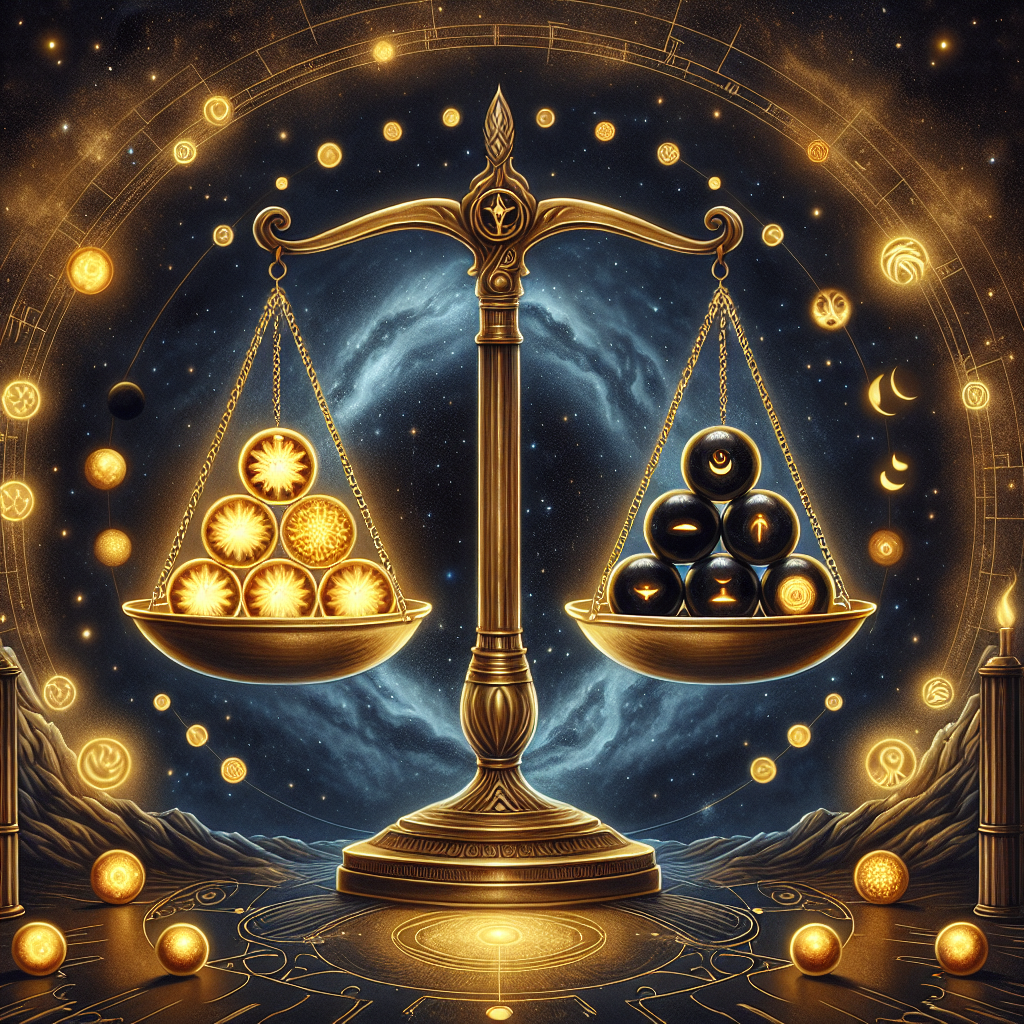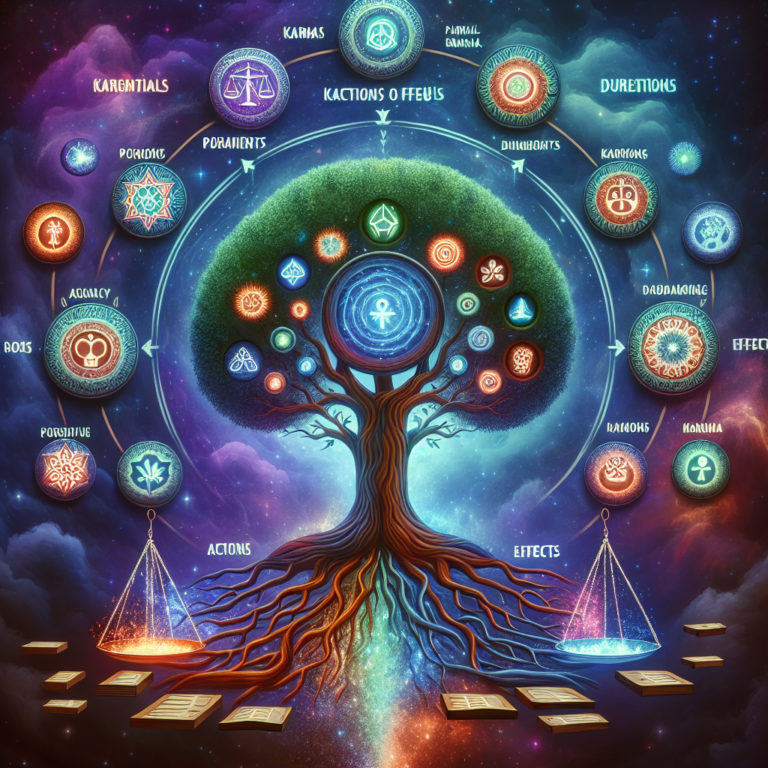Karma is a profound concept found in various religions and philosophies, often interpreted as the law of moral causation. In essence, it asserts that every action generates a corresponding result, ultimately impacting not just the individual performing the action but also the broader cosmic or universal balance. This intricate interplay of actions and consequences invites us to explore the intricate dynamics of justice both on earthly planes and beyond.
Understanding Karma
The root of the term ‘karma’ stems from the ancient Sanskrit word ‘karman,’ meaning ‘act’ or ‘deed.’ While its interpretations vary across different cultures and philosophies, its underlying principle remains the same: every action – whether good or bad – creates an energetic imprint that influences future events.
The Law of Cause and Effect
Karma operates on the universal law of cause and effect, demonstrating how actions lead to consequences. For example, performing a good deed could foster positive experiences in the future, while engaging in harmful behavior can generate negative repercussions. This interplay of cause and effect is essentially what underpins the broader notion of justice.
Karma in Different Cultures
Different cultures and religions have incorporated the concept of karma into their beliefs:
- Hinduism: Karma is integral to the belief system, where it shapes an individual’s cycle of birth and rebirth (samsara). Good karma leads to favorable rebirths, while bad karma results in suffering.
- Buddhism: Similar to Hinduism, Buddhism teaches that karma affects future lives but emphasizes the importance of mindfulness and intention behind actions.
- Jainism: In Jainism, karma is seen as a form of physical substance that attaches to the soul, impacting its spiritual development.
- Western Philosophy: While not explicitly referencing ‘karma,’ many Western philosophies and religions address the moral consequences of actions, with concepts of divine justice shaping their interpretations.
Justice and Morality
The concept of justice is deeply intertwined with moral standards and ethical behavior. It serves as a societal foundation for determining right from wrong, with legal systems often reflecting collective concepts of justice. However, what happens when human constructs of justice fail? This is where the cosmic law of karma becomes particularly relevant.
Karma as Cosmic Justice
Karma transcends human justice systems, operating on a cosmic level. It emphasizes a universal accountability where actions eventually find their way back to the original actor, whether in this life or in future reincarnations.
The Limits of Human Justice
Human judicial systems, though necessary, are often flawed. Factors such as corruption, inequality, and subjectivity can distort the pursuit of justice. Here, the principle of karma acts as a reassuring belief that, in the grand scheme of existence, wrongs committed are inevitably set right at some point.
The Timing of Karma
One of the most challenging aspects of karma is its timing. The consequences of one’s actions may not be immediately visible; they could manifest years or even lifetimes later. This fluid temporal aspect can be frustrating, especially for those seeking immediate vindication or retribution.
The Role of Intent
Intent plays a pivotal role in the law of karma. The motivations behind actions significantly influence the karma created. For example, helping others out of genuine compassion generates positive karma, while acts done with selfish motives can taint those same actions. The differentiation of ‘good’ and ‘bad’ karma leads us to consider the importance of awareness and mindfulness in our daily lives.
Mindfulness and Karma
Practicing mindfulness encourages individuals to be present and aware of their thoughts, actions, and their consequences. This self-awareness aids in making more conscious decisions, aligning one’s actions with the intentions of fostering goodwill and positivity.
Personal Growth through Karma
Engaging with the principles of karma can be a transformative experience. It fosters personal accountability, urging us to examine our behaviors and their impact on others. By understanding that our actions have consequences, we begin to cultivate a sense of responsibility towards ourselves and the world around us.
Learning from Karmic Lessons
Another significant aspect of karma is its capacity to teach valuable life lessons. Often, the challenges and difficulties we face are direct reflections of our past actions, serving as opportunities for growth and enhancement of our character. Embracing these lessons can lead to a greater understanding of ourselves and our place within the universe.
Karma in Contemporary Society
In today’s complex world, the principles of karma remain relevant. With the rise of social media and globalization, the impact of our actions is magnified, making it all the more crucial to act with integrity. A single action can ripple across communities and even continents, reinforcing the importance of mindful decision-making.
Collective Karma
Beyond individual actions, entire communities and societies create collective karma. Shared values, beliefs, and behaviors impact broader societal dynamics, influencing how justice, either positive or negative, manifests on a larger scale. This notion challenges us to consider how our societal contributions shape collective karma and the world we wish to inhabit.
Critiques and Misinterpretations of Karma
While karma is a profound concept, it is not without its critiques. Misinterpretations can lead to harmful beliefs, such as blaming victims for their misfortunes. Such a perspective neglects the complex realities of life and the myriad factors influencing human circumstances.
Cultural Misunderstandings
The concept of karma can be misrepresented in popular culture, often reduced to a simplistic understanding of ‘what goes around comes around.’ This reductionist view overlooks the nuances and depth of the principle, diminishing its potential for genuine reflection and growth.
Balancing Karma with Compassion
In discussions of karma, it is essential to balance justice with compassion. Engaging with others through kindness and empathy rather than solely measuring their actions can lead to a more harmonious understanding of human experiences and the complexities of existence.
Conclusion
The intricate relationship between karma and justice reveals profound lessons about the nature of our actions and their repercussions. Understanding that our actions ripple through the fabric of the universe ignites a sense of responsibility and urgency to act with care and consideration.
As we navigate the complexities of our lives, let us embrace the principles of karma diligently, recognizing that intention and awareness shape our paths. By engaging with this cosmic law, we can foster a more just and equitable world, cultivating a culture of mindfulness and compassion.
Frequently Asked Questions (FAQs)
What is karma?
Karma is the principle of cause and effect, where an individual’s actions (good or bad) influence their future circumstances. It encompasses moral accountability, extending beyond immediate life experiences.
How does karma work?
Karma operates on the basis that each action has consequences. Good deeds generate positive outcomes, while harmful actions lead to negative consequences, potentially impacting one’s current life and future reincarnations.
Can karma be changed or altered?
While past actions have established a karmic influence, individuals can change their future karma by making conscious and positive choices moving forward. Mindfulness and compassionate actions can create new, positive karmic imprints.
Is karma related to justice?
Yes, karma is often viewed as a form of cosmic justice. Human systems of justice may fall short, but the principle of karma emphasizes that wrongs will ultimately be righted at some point in existence.
Can victims have bad karma?
This is a complex question. While it is crucial not to blame victims for their suffering, some beliefs suggest that individuals may experience the karmic consequences of past actions. However, compassion and understanding are vital in these discussions.
How can I cultivate positive karma?
To cultivate positive karma, focus on being mindful of your actions and intentions. Engage in compassionate behavior, help others, and strive to act in ways that promote positivity and goodwill.
,
It seems you might be looking for a writing prompt! Here are a few options across different genres:
Fantasy: In a world where emotions can be harnessed as magical energy, a young sorcerer discovers that their feelings are more powerful than anyone else’s. What do they do with this newfound ability?
Science Fiction: Humanity has developed technology that allows people to relive their most cherished memories. One day, an engineer stumbles upon a hidden memory that reveals a shocking truth about their past. What is this truth, and how does it change everything?
Mystery: A small town wakes up to find that all the clocks have stopped at the same time. As the town’s residents begin to investigate, they discover a connection between the time freeze and a long-buried secret. What do they uncover?
Romance: Two people discover that they share the same favorite rare book, which has seemingly disappeared from all libraries and stores. Their quest to find the book leads them on an unexpected adventure, changing their relationship along the way.
- Horror: After moving into an old house, a family finds an ancient journal in the attic that details the history of the house. As they read, they realize that the events described mirror their own experiences in increasingly unsettling ways.
Feel free to choose any prompt that resonates with you, or let me know if you’d like a different type of prompt!
, #Karma #Justice #Cosmic #Law #Effect, #Karma #Justice #Cosmic #Law #Effect, 1734041629, karma-and-justice-the-cosmic-law-of-cause-and-effect





